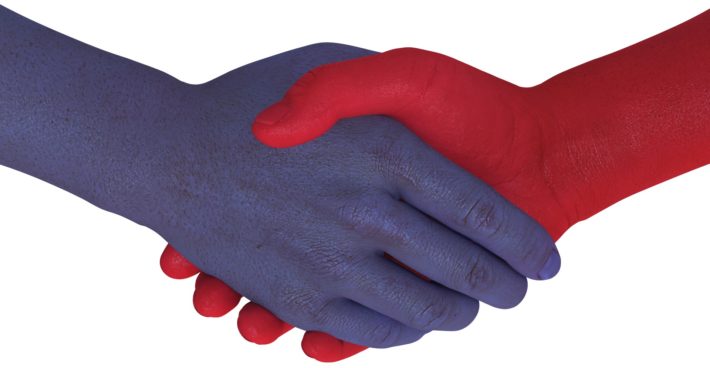Growing up in the great state of Ohio, I was indoctrinated into sports fandom at a young age. Primary in this fandom was an undying love for Ohio State football. I was surrounded by it on all sides, and I embraced it with naive open arms.
But almost more importantly than learning to worship our beloved Buckeyes was a terse requirement to despise our terrible rivals at the University of Michigan. In fact, most of the entire season often boiled down to understanding that Michigan was the real foe, and defeating them was the only thing that actually mattered.
Fast forward a couple decades, and suddenly I’m an adult (sort of) who understands that sports are all in good fun. The rivalry is for spirit, and it’s played up mostly for kicks. This is a common trend for the simple human mind: it’s easier for us to buy into an idea when we have an antagonist to oppose the hero at our center. After all, emotions of animus might be even stronger than agreeableness. And this basic idea has seeped into nearly all aspects of our culture — in particular, our political media.
It’s not surprising how often people complain about the US government. We complain about how inept congress is, or how big the debt is, or how corrupt Washington is. I have absolutely ranted about the latter over a beer. Big money and corporate lobbyists have unquestionably tainted both sides of the aisle. I’m not sure anyone is disputing that.
But this said: are we seriously complaining endlessly about the ineptitude of people that we elected?
No. We aren’t. We’re usually complaining about the other guy, aren’t we? The candidates we didn’t vote for. The bad guys! The people we voted for are doing just fine. It’s always that other party that is mucking up the country. If only they were open-minded like we are!
Okay, the sarcasm is strangling you, so let me apologize. But I’d say this is where the real problem with this country is blooming: people treating politics like it’s sports, or even religion. Where your faith alone in your beliefs is enough to justify that they’re right. It’s a dogmatic purpose, and it’s really no different than being told which football team to cheer for or against.
It all comes down to why we behave this way. How did we end up choosing one side? And why are there “sides” to begin with when we’re all rooting for the same country? The short answer is that most of our learned information — and by proxy, our belief systems — come directly from our community. And that community is driven by the media it consumes.
 Unfortunately, media outlets in the 21st century are driven by money. And they’ve realized that the easiest way to make money is to create an agenda that appeals to one demographic and villainizes another. People are very attracted to the idea of an adversary — we’ve been trained this way since the Disney films of our childhood. So of course our news has recreated this for us, whether it’s authentic or not.
Unfortunately, media outlets in the 21st century are driven by money. And they’ve realized that the easiest way to make money is to create an agenda that appeals to one demographic and villainizes another. People are very attracted to the idea of an adversary — we’ve been trained this way since the Disney films of our childhood. So of course our news has recreated this for us, whether it’s authentic or not.
Because of this, we are less educated — and because of that, we are divided. Regardless, it’s simply more profitable for media corporations to create a strawman for us to oppose than it is for them to inform us through honesty and humanity.
Meanwhile, our elected officials are forced to reflect the people who voted them into office in order to stay in office. This is why congress, much like the American public, cannot come to an agreement on anything. Since we as constituents are so polarized, so too must be the politicians who represent us. And instead of just polarized, we all become paralyzed.
Complaints still carry merit, but it’s important to recognize that most of these perceptions have also been created by our consumed media.
All is not quite as hopeless as it seems, though. We just need to quickly glance at the bigger picture.
By and large, all Americans want the same things: better healthcare, better education, more peace, less violence, increased opportunity, and higher standards of living. Both parties are comprised largely of good people who are being puppeteered by conflicting news sources. They bend and break the truth in the process, all at the expense of public cooperation.
Essentially, disinformation is what’s profitable. Painting a picture where one party is the center of all that’s pure and wholesome, while the other is a mustached villain with America tied to the train tracks. And that’s secretly what we all gravitate toward without even realizing it: something to root for and something to root against. Is this truly the way we want to consciously live?
It’s time to discard our tribalism to politics and creeds, and climb out of the trenches. If you consider yourself a decent person, you are better than being a simple media pawn. So stop building walls and creating enemies where they don’t exist. Inevitably, most human beings agree about the lives we want for ourselves and our loved ones. Demonizing half of society does nothing to help our cause — understanding and learning can do everything. We need to try harder to expand our horizons.
Because even if it’s tough to admit, now that I’m an adult, some of my closest friends are fans of Michigan football.

